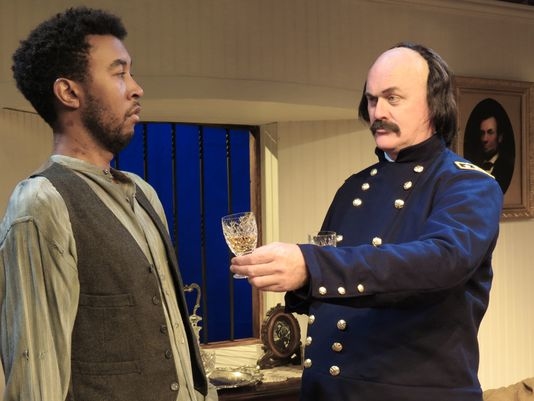Butler

(© Suzanne Barabas)
Historical drama scratches a certain theatrical itch that no other genre can reach. The most treasured stories of popular culture are woven into rich, three-dimensional worlds where their leading characters are transformed into flesh-and-blood human beings, accessible in both body and spirit. This was certainly the formula for the success of All the Way, Robert Schenkkan's homage to President Lyndon Baines Johnson, which was just handed the biggest prize of the Broadway season. In a similar political vein, playwright Richard Strand is now premiering his newest work, Butler, at New Jersey Repertory Company, taking a stab at the story of Benjamin Franklin Butler — a major general for the Union Army during the Civil War whose actions facilitated the eventual emancipation of Southern slaves. Butler's controversial activities and ambiguous motivations are, at the very least, comparable in theatrical potential to the fight for civil rights legislation that lends LBJ's story its central conflict. Strand, unfortunately, has not given his raw material the dramatic heartbeat necessary to convert this historical anecdote into a pulsating human story.
To call Butler a historical "drama" is a misnomer from the start. The lighthearted hand that Strand has lent to this portion of American history draws it closer toward farce than an earnest dissection of this confounding story. Set in May 1861 in Fort Monroe, Virginia, immediately following the declaration of the Civil War, the play opens on the portly General Butler (Ames Adamson) whose drooping mustache and ludicrously receding hairline set a scene unfortunately well-suited for sketch comedy. He attends to business in his office, appropriately decorated by designer Jessica Parks with a collection of period tchotchkes and a portrait of President Abraham Lincoln. Lieutenant Kelly (a fresh-faced Benjamin Sterling) suddenly enters to inform him that three black slaves have rowed from the Confederate territory across the James River to the Union-held citadel that Butler has recently taken under his wing.
One of these slaves is a man by the name of Shepard Mallory (John G. Williams), a particularly audacious young slave who has somehow gathered the nerve to "demand" an audience with Butler. Despite Butler's long-winded speech about his aversion to "demands" — one of the play's many tedious comedic attempts — he consents to the meeting. The incorrigible Mallory can then plead his case directly to the austere general, requesting that he defy the Fugitive Slave Law by allowing him to stay and fight with the Union army — the alternative being certain death at the hands of his Confederate owner, Colonel Charles Mallory. As a noted anti-abolitionist, to do so would have been grossly out of character for Butler. Yet the former attorney ends up using his legal wiles to classify the escaped slaves as "contraband" — a loophole that allows the fugitives to maintain their newfound freedom, though he risks both his career and reputation in the process.
Strand — along with director Joseph Discher —does well enough theatrically laying out the details that are already sufficiently documented in historical record. What they fail to do is add dimension to this set of characters, whose underlying complexity is the intriguing crux of this momentous historical event. Adamson capably delivers his lines like the stately general he is, though this grand persona should not so snugly fit a man who has only just been promoted to this high military post.
Butler's relationship with Mallory, which inexplicably shifts from hostile to amiable — literally overnight — offers a similar opportunity for emotional development that Strand wholly evades. Williams is let loose on a number of intellectually advanced tirades, which, we are led to believe, are cunning enough for his character to win over Butler's heart (the history of Mallory's anomalous education, not to mention his jarring self-confidence, also remain ambiguous). Nonetheless, for a period in which racism was just as rampant among the northern states as slavery was throughout the Confederacy, we should expect a little more than a winning personality to convince a high-powered Union general to spit in the face of the American Constitution.
A perplexing individual even to himself, we are expected to reconcile Mallory's uncharacteristic behavior as a sign of a natural-born revolutionary, who just happens to be living at the height of American slave culture. Williams' performance, however, offers no trace of the era or circumstances that should have molded his identity, carrying himself with a posture more reminiscent of an inner-city hoodlum than an emotionally weary runaway slave.
As insults, punches, and glasses of sherry are periodically thrown and exchanged, the potentially meaty theatrical core of the story seems to drift further and further away from the action onstage. A few witty scenes are thrown in the mix — particularly Adamson's scene with the stoic David Sitler, who debates Butler's "contraband" argument as Colonel Mallory's pompous Confederate representative, Major Cary. Yet, without a solid anchor grounding the characters in their historical context, even the play's most clever moments go no further than the shallow entertainment of a Civil War reenactment.











